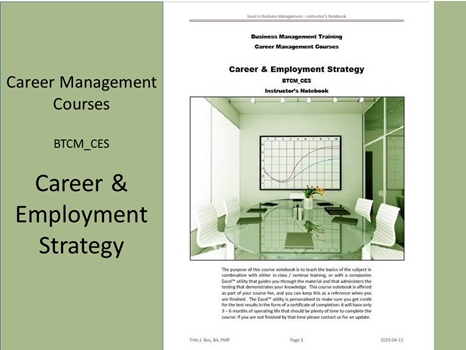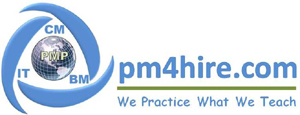
Career & Employment Strategy BTCM_CES
We focus on how to find job opportunities, apply and complete a successful interview to obtain a career starting opportunity. It is important to look at everything you have studied: reflect on direct skills and indirect skills, projects, exercises, or experience that you use to show what you have achieved. This is separate from the impetus for starting your program of study – you are focusing on how you will use what you have learned in order to make an impression on the hiring manager, while later you can explore what other learning is helpful for building your career. At this stage we assume you are done with your studies, or you have been downsized, or you find it necessary to change jobs to maintain your sanity – this can happen to anyone at any time, and it can be helpful to use this particular course as a guide that steps you through the process.
Most people do not realize how much they have increased in value by studying, or by working in a job and becoming more experienced. You will be surprised at how many people still edit their old high-school resume when their schooling has already become a side-note to the experience they have gained in the workplace. If you mention continuing education, you can emphasize the drive to continuous self-improvement as a personal characteristic that is highly valued by future employers, for example. Completing a college diploma or a university degree is an achievement, but emphasizing the practical application of what you have learned and how you can deliver that bundle of skills to benefit a future employer offers a completely different perspective. Building a portfolio of accomplishments will help you to emphasize your value to any workplace setting, in spite of the reality that you seldom repeat the same kind of work again for another employer.
Resume update = polish the student’s resume, maximizing its power of persuasion to interest hiring managers and gate keepers alike, and develop strong career objectives that are supported by customized resumes if necessary. Your resume is a window into who you are and what your contribution potential is – a good reason for going the extra mile to consider several versions of your resume, each targeted to a different class of potential employers depending on the types of opportunities you might be interested in.
- Learn to tailor your resume to each specific career path, so as to (de)emphasize knowledge and experience based on employer needs in each particular career field.
- As you take additional training and/or gain new experience you must add that to your resume, but don’t emphasize training over actual experience (the high-school resume model).
- The purpose of a resume is to get invited for an interview: make sure you have a story to tell about each item on the resume as it is likely the interviewer will focus their questions on the resume.
Job Advertisements & Cover Letters = learn to read job postings in order to generate powerful cover letters that speak to the opportunity, and how to combine that with a relevant resume to best market the candidate on the job market. The cover letter is attached to the resume to add the customization and the appropriate sales pitch that highlights how well you are suited for the advertised opportunity. Our goal is to have at least 5 applications in the pipeline by the end of this course and that you have your resume posted on at least 2 job boards. We will review basic relationship management strategies to keep track of progress.
- Learn how to match a career field resume to a specific job and how to sell relevant skills based on employer needs by making it easy for the employer to see how you are a fit for the job.
- Understand the principles of mirroring your cover letter to what the employer asks for in their job posting, and make sure there are no requirements overlooked.
- Understand the concepts of a “broadcast letter” that is used on a job-board to highlight what you are focused on, rather than to leave it up to the employers to figure out your career path.
Interviewing skills = learn the concepts of “elevator speech” introductions of the individual, of their training, of their work history, and perhaps of their interests if relevant to the job search. Learn how to build on these concepts to pre-empt surprise questions, and how to maintain full control over your responses while maintaining perfect composure under pressure. Create a kit that you can use to guide the interviewing process, and to make sure you are prepared with all the required self-marketing materials at your fingertips. Learn how to hone your networking skills with good techniques for self-promotion without coming across as begging for a job.
- Learn how to establish a confident presence and to maintain control over the delivery of pertinent information in ways that resonate with personality traits of hiring managers.
- Learn to see every situation as a potential “interview” – the lady you are chatting up in a doctor’s waiting room might very well be an HR manager about to place a job posting.
- Many people like to talk about themselves when dating, yet are tongue-tied when interviewing, so think about the interview as a blind date with someone you may develop a relationship with.
Professional Portfolio = learn the concepts of developing a powerful professional portfolio (presentation binder), to demonstrate your depth of knowledge and experience, and to show your readiness to step up to the plate and to be productive. Understand the need for life-long professional development and skills maintenance to remain current with changing technology, and reflect that in your portfolio. You may create a couple of presentation binders: one for your academic achievements, one for your career achievements, and perhaps one for your life goals.
- Each page in each binder is enveloped in plastic, and clearly has the appearance of a catalog with protected sheets. This means people will not remove pages (they may ask to copy pages).
- Each page forms the root of a dialog: by presenting your experience in a structured format you can be prepared to discuss each page if asked.
Self-Assessment & On-going Personal Development = skills building is an on-going effort that is based on the learning skills acquired in college, and enhanced with past and current hands-on business experience as well as transferable skills. The candidate learns to perform gap analyses that help them to identify what further opportunities would enhance their marketability and to establish learning goals and a plan for career development with value-added workplace skills. We summarize the career development process and explore the potential benefits of working with a career coach.
Learning Formats BTCM_CES
This course is currently available in a classroom setting (public or company private) with approximately 15 contact hours.
PDF – Certificate Of Completion
Each course offers a certificate of completion that identifies the course, the student, and a brief description of the course. To receive a certificate the student must have attended at least 80% of the course sessions. This personalized certificate is forwarded to the student by Email.
PDF – Course Notebook
Each course includes a notebook in PDF format that provides the minimum knowledge the student must master in order to obtain the certificate. In the notebook you will find references to other study materials. Students receive the notebook by Email when their registration is confirmed.
PDF – Program Overview
An overview of this study program can be downloaded from the website by right-clicking on the program link on the enquiry page.
PDF – Current Training Schedule
A list of upcoming training sessions can be downloaded from the website by right-clicking on the schedule link on the enquiry page.
Registration – Service Providers
To register for any training course please look on the enquiry link page of your service provider (from where you accessed this website). On the page you will find a registration request form where you can order the course that you are interested in. The availability dates will be provided to you, along with payment instructions if you decide to go ahead.

 |
|